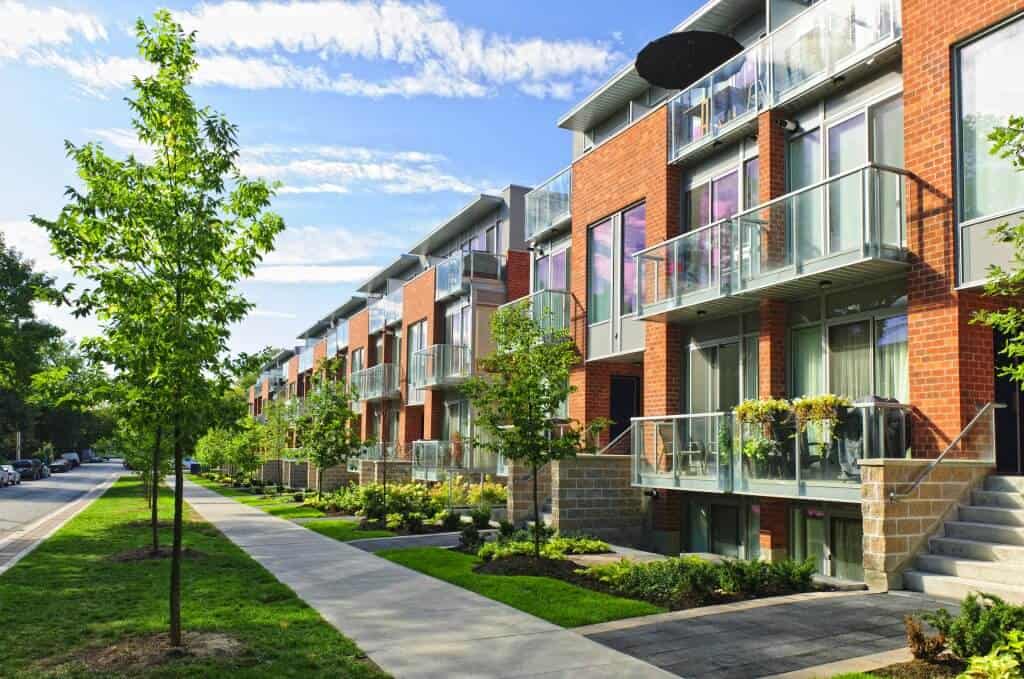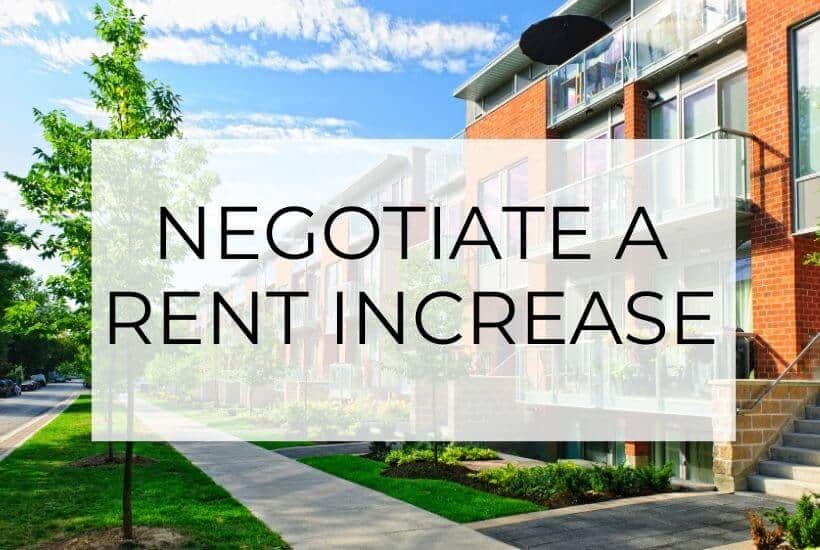How to Negotiate a Rent Increase (the Easy Way)

No one looks forward to their annual lease renewal. The imminent rent increase expected at that time can be a source of great stress. Especially if you live somewhere with a hot rental market. If you anticipate that your landlord / rental property company will increase your rent dramatically, it’s best that you come as prepared as possible. This post will give you tips and advice on how to negotiate a rent increase, so that you can keep your rental costs as low as possible.
How Much Should Rent Increase Each Year?
The average rent hike in the US is around 3-5% each year – so if you are paying $1000 for rent, you could expect that price to rise to between $1030-$1050. However, you should note that most places don’t have rent control. This means that your landlord could potentially raise your rent from $1300 to $2300 if they felt like it. I would say that this is typically not the norm, but you might see large hikes happen in big cities with growing populations like LA, DC, or San Francisco.
For example, in my third year of living in the DC metro area, my landlord attempted to increase my rent by nearly 20 percent! I did successfully fight it, so the tips I learned in the process are what I’ll share with you today.
It should be noted that it is illegal for your landlord to raise your rent during the terms of your current lease. If that is an issue that you are dealing with, you should flag to your local housing authority.
Set an Acceptable Rent Increase Limit
As a renter, you should have a clear idea on how much you personally feel is an acceptable rent increase. The number you come up with should be based on your personal budget. Note, it’s recommended that your housing costs take up 30 percent or less of your total after-tax income. Even better if that amount is lower!
Once your housing budget is set, make a promise to yourself that you will not budge. This will help put you in the proper mindset to negotiate your rent increase into an acceptable range.

RELATED: How to Use the 50/30/20 Budget
Understand the Rental Market in Your Area
Before you start your rental negotiations, you need to have a good understanding of the rental market for the city in which you live. This is going to take a bit of elbow work – so just get ready. Your job is to check ALL the rental listings in your neighborhood. Here are resources that I recommend:
- Realtor.com
- Trulia.com
- Zillow.com
- Craigslist
- Facebook Marketplace
- Local Newspaper
Remember, stick to your neighborhood, as rents can vary drastically by specific locale in many cities. And I know I said check ALL the listings, but really just try to review at least 20 or so listings that are similar to your home. This means looking at homes that have a similar:
- Number of bedrooms
- Number of bathrooms
- Parking
- Amenities such as pool, gym, recreation room
At the conclusion of your research, you should have very good information to use as leverage in your rental negotiation.
Collect Data on Rent Hikes in Your Neighborhood
Next, you should get direct information as well. This part can seem a little intimidating, but I think it’s very helpful in getting the full picture of the nearby rental market. The goal for this part is not to discuss how much your neighbors are paying for rent, but rather, what percent their rent was ultimately raised in their past renewal.
- Interview Your Neighbors: If you have a few neighbors that you talk with regularly don’t hesitate to get the scoop from them. Particularly if they have lived in the same building as you for several years. They can give you insights into trends and whether or not they’ve been happy with the landlord / rental property manager for the past few years. It’s never a bad idea to see if putting the effort to negotiate your rent is actually worth it.
- Survey nearby apartments: Next, you need to just start apartment shopping in nearby buildings. When I was preparing for my negotiation, I walked the blocks around my apartment building and did property tours. At the end of each tour, I asked the leasing agents how much to expect in terms of a rental increase at the end of the lease. And this was information we gladly shared
One thing to note, if you’re finding that rent is going up around you and your rental increase is on par with the neighborhood, you do lose some negotiation points. However, there are are few other arguments you can bring up – and we’ll discuss those below.
How do you Argue Against a Rent Increase?
So now it’s time for the rental negotiation. Gather all your information in a folder (online or physical) and schedule time to meet with your landlord / leasing office. Don’t forget – choose a time that works for YOU. This is YOUR meeting. Make it clear that you want to discuss the terms of your lease. If you don’t want to be super direct / fear this would give them the upper hand, you could also just say you have questions on the renewal that you want to discuss.
As you begin your discussion, spend some time mentioning your strong history as a tenant. Include details such as on-time payment, bringing in new lessees, and/or any improvements that you may have done to the apartment. Note, these are just a few ideas – you’ll need to develop your own list of why you’re the best tenant out there.
Next, you should go through your findings on how much other nearby apartment complexes / rental properties raise their rent year over year. Give the average percentage of rent hikes as well as rent prices for comparable homes in your area.

At this point, the conversation should go back and forth – and if you have a reasonable landlord, you should be able to negotiate the price down. As you negotiate, be sure to stay calm and kind – you will be surprised how much that helps. And also, try to pause and be reflective before talking. Taking a reactionary approach will lead to poorer results – keep emotions at the door.
As an alternative, some experts recommend that you send the negotiation points in writing instead of in person. This is a great tip, particularly for those of you who may get a bit nervous during an in person discussion.
In my experience, I started the conversation in person, but then continued the conversation over email until the rent was lowered acceptably.
How do you Prevent Future Rent Increases?
Now that your rent is where you want it – your goal should be to prevent future rent increases as well. One great way to do this is by opting for a longer lease term. So if you typically do a one year lease, try to throw a 18-month or 24-month lease term into your rent negotiation. Landlords are always happy when a good tenant stays on board. And know that this is an especially good argument to throw into the mix if the rent is generally going up in the area around you.
If you present these great ideas to your landlord / leasing agent and they still won’t budge you should consider if it is still worth it to live there. If your answer is “no”, think back to the nearby rentals your toured when collecting data on the rental market. If one of those places is a better fit and has a more reasonable lease renewal process, go ahead and make the switch.
RELATED: The Best Budget Worksheet Printable
In Summary | How to Negotiate a Rent Increase
I hope that now you feel like a pro and can negotiate a rent increase with ease. Or make a smart choice on where to move if your landlord won’t be reasonable and budge. Know that you have a lot of leverage in the rent increase process. You should never just take your renewal as bible without having a discussion.
In summary, here are the key points to negotiating a rent increase:
- Know Your Limit – Having a set budget makes a difference
- Understand the Rental Market – Understand the prices of similar rentals in your neighborhood
- Collect Data – Ask direct information on how much rent is typically raised in your area
- Negotiate Strategically – Bring your data to the conversation and speak to your tenant superpowers
- Prevent Future Increases – Do all that you can to keep rent low going forward and reduce the need for further negotiation

